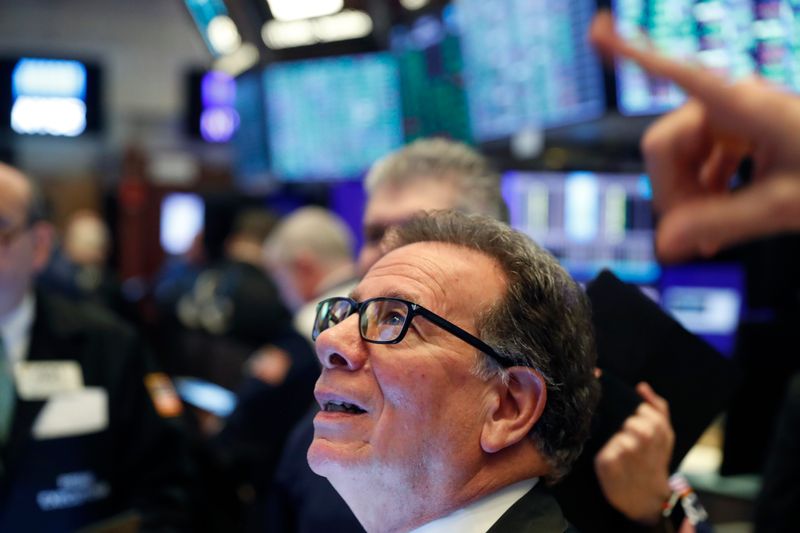This post was originally published on this site
 © Reuters. Traders work on the floor of the New York Stock Exchange (NYSE) after the opening bell of the trading session in New York
© Reuters. Traders work on the floor of the New York Stock Exchange (NYSE) after the opening bell of the trading session in New YorkBy Sanjana Shivdas and Medha Singh
(Reuters) – A rebound on Wall Street on Friday fizzled out following reports that President Donald Trump was set to declare a national emergency to tackle the rapidly spreading coronavirus outbreak.
Trump said earlier he would hold a news conference at 3 p.m. ET (1900 GMT) about the pandemic, without providing details.
Wall Street’s fear gauge () jumped to its highest since the 2008 financial crisis after logging its biggest-ever one-day surge in history on Thursday.
“There’s no question there is a sort of skittishness in the market about what the plan is, and how we are going to work through this,” said Gordon Charlop, managing director at Rosenblatt Securities in New York.
“At this point, I still think the risk is more to the downside than the upside.”
All three main stock indexes gained more than 6% in early trade following the worst daily selloff in more than three decades in the previous session, as investors bet on another round of fiscal stimulus to thwart a looming global recession.
Travel stocks, hammered in the rout, led gains, with the S&P 1500 airlines index <.SPCOMAIR> up 1.2%. Hotel operators Marriott International Inc (O:), Hilton Worldwide Holdings (N:) and Hyatt Hotels Corp (N:) advanced between 2.1% and 4.3%.
The heavyweight technology () sector was up 2.3%, while the rate-sensitive financial sector () gained 3.4% as U.S. Treasury yields rose. [US/]
Energy stocks () erased earlier gains to trade 2.3% lower, while utilities () fell 0.6%.
Apple Inc (O:) rose 3.4%, providing the biggest boost to the benchmark S&P 500, as the iPhone maker said it would reopen all 42 of its branded stores in China.
At 11:55 a.m. ET, the Dow Jones Industrial Average () was up 285.80 points, or 1.35%, at 21,486.42, while the S&P 500 () was up 32.46 points, or 1.31%, at 2,513.10. The Nasdaq Composite () was up 73.81 points, or 1.02%, at 7,275.61.
The indexes remained about 25% below their record highs hit mid-February, and were on track for their biggest weekly declines since the 2008 financial crisis.
Boeing Co (N:) jumped 6.5% but was still on track for its worst weekly slump in history on rising concerns about the company’s growing cash burn.
Software company Oracle Corp (N:) jumped 9.7% after topping quarterly profit and revenue expectations and flagging a “minimal impact” from the virus outbreak on its fourth-quarter revenue.
Advancing issues almost matched decliners on the NYSE and the Nasdaq.
The S&P index recorded no new 52-week high and 106 new lows, while the Nasdaq recorded one new high and 511 new lows.
Fusion Media or anyone involved with Fusion Media will not accept any liability for loss or damage as a result of reliance on the information including data, quotes, charts and buy/sell signals contained within this website. Please be fully informed regarding the risks and costs associated with trading the financial markets, it is one of the riskiest investment forms possible.


